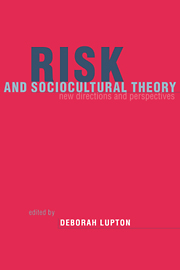Book contents
- Frontmatter
- Contents
- List of contributors
- Introduction: risk and sociocultural theory
- 1 Postmodern reflections on ‘risk’, ‘hazards’ and life choices
- 2 Fear of crime and the media: sociocultural theories of risk
- 3 Risk and the ontology of pregnant embodiment
- 4 Risk anxiety and the social construction of childhood
- 5 Constructing an endangered nation: risk, race and rationality in Australia's native title debate
- 6 Risk, calculable and incalculable
- 7 Ordering risks
- Index
6 - Risk, calculable and incalculable
Published online by Cambridge University Press: 16 September 2009
- Frontmatter
- Contents
- List of contributors
- Introduction: risk and sociocultural theory
- 1 Postmodern reflections on ‘risk’, ‘hazards’ and life choices
- 2 Fear of crime and the media: sociocultural theories of risk
- 3 Risk and the ontology of pregnant embodiment
- 4 Risk anxiety and the social construction of childhood
- 5 Constructing an endangered nation: risk, race and rationality in Australia's native title debate
- 6 Risk, calculable and incalculable
- 7 Ordering risks
- Index
Summary
Nothing is a risk in itself; there is no risk in reality. But on the other hand, anything can be a risk; it all depends on how one analyses the danger, considers the event.
(Ewald, 1991: 199)Introduction
There is no such thing as risk in reality. Risk is a way – or rather, a set of different ways – of ordering reality, of rendering it into a calculable form. It is a way of representing events so they might be made governable in particular ways, with particular techniques, and for particular goals. It is a component of diverse forms of calculative rationality for governing the conduct of individuals, collectivities and populations. It is thus not possible to speak of incalculable risks, or of risks that escape our modes of calculation, and even less to speak of a social order in which risk is largely calculable and contrast it with one in which risk has become largely incalculable.
A second proposition follows: the significance of risk does not lie with risk itself but with what risk gets attached to. Risk, to put it in Kantian terms, is a category of our understanding rather than intuition or sensibility (cf. Ewald, 1991: 199). If the task of critique – after the work of Michel Foucault – is to investigate the historical conditions of true knowledge, then the critique of risk will investigate the different modes of calculation of risk and the moral and political technologies within which such calculations are to be found.
- Type
- Chapter
- Information
- Risk and Sociocultural TheoryNew Directions and Perspectives, pp. 131 - 159Publisher: Cambridge University PressPrint publication year: 1999
- 165
- Cited by

